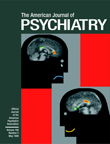Drs. Koenig and George Reply
To the Editor: My colleagues and I applaud Arjan Braam, M.D., and his colleagues for their excellent work examining the effects of religion on depression outcome in older adults in the Netherlands. These investigators conducted a 12-month prospective study of 177 persons aged 55–89 years who were selected from a large community-based population if they scored 16 or higher on the Center for Epidemiologic Studies Depression Scale. Religious salience was measured by a single variable. Subjects were asked to choose the three domains of life they considered most important in their present situations. Among the eight domains presented to subjects was “a strong faith”; if the subjects chose “strong faith,” religion was considered salient to their lives (29% of subjects). Absence of religious salience was associated with persistence of depression (odds ratio=5.91, 95% confidence interval=1.48–23.6). This effect was stronger in women; in fact, 100% of women with low religious salience (N=24) had persistent depression compared with 50% of women with high religious salience (p<0.01). Among subjects with one or more chronic illnesses, those with pain, and those with one or more functional limitations, the effects were particularly strong.
As Dr. Braam and colleagues note, their discovery of a strong effect of religious salience on depression in older adults with chronic illness and disability is the same pattern of results we have now found in two separate studies of medically ill older adults in the southern United States. Investigators in other areas of this country have likewise discovered that religiousness appears to buffer the effects of stress, whether related to health problems (1, 2) or other significant losses (2–4). Idler, reporting data from the Yale Health and Aging Study, found that at any given level of chronic medical illness, elderly men who were more religious perceived themselves as less disabled than did less religious men with the same level of chronic illness (1). Thus, religiousness may provide a more positive outlook on health and ability to function, particularly among elderly people with chronic, often untreatable, medical disability.
Dr. Braam and colleagues’ report from the Netherlands, where religious beliefs and practices are less common than in the Bible Belt South and many other areas of the United States, is especially important because it suggests that these findings may apply more widely, particularly to populations where religion is less of a cultural force in society.
1. Idler EL: Religious involvement and the health of the elderly: some hypotheses and an initial test. Social Forces 1987; 66:226–238Crossref, Google Scholar
2. Williams DR, Larson DB, Buckler RE, Heckmann RC, Pyle CM: Religion and psychological distress in a community sample. Soc Sci Med 1991; 32:1257–1262Google Scholar
3. Maton KI: The stress-buffering role of spiritual support: cross-sectional and prospective investigations. J Scientific Studies of Religion 1989; 28:310–323Crossref, Google Scholar
4. Kendler KS, Gardner CO, Prescott CA: Religion, psychopathology, and substance use and abuse: a multimeasure, genetic-epidemiologic study. Am J Psychiatry 1997; 154:322–329Link, Google Scholar



